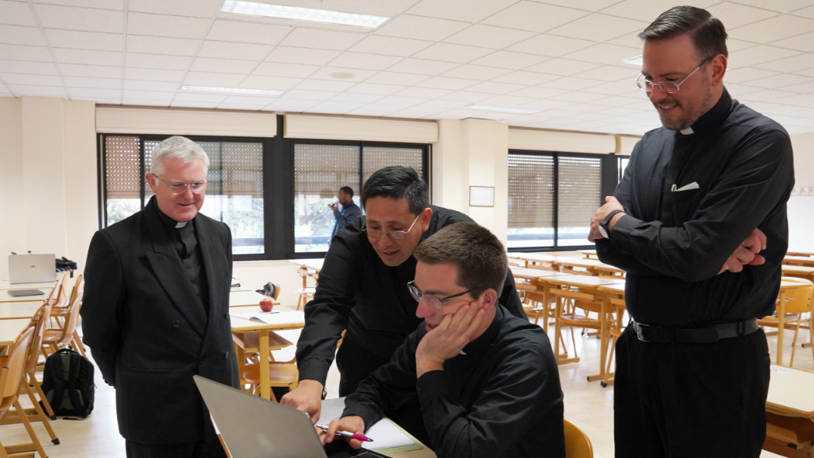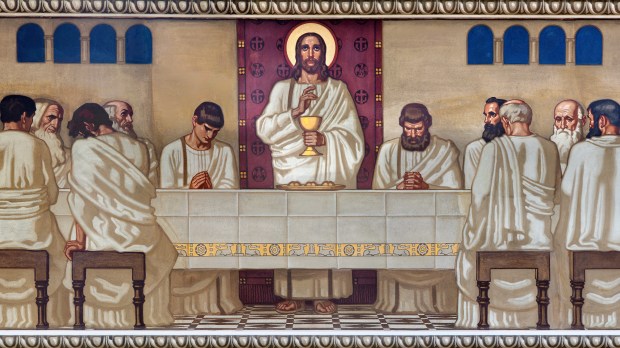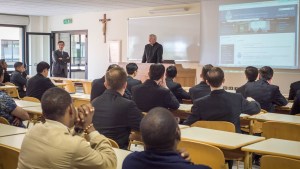The educational offer of the Pontifical Athenaeum Regina Apostolorum is presented on the institutional website (upra.org) with these words: “All of the academic activity of the Athenaeum is oriented toward the fulfillment of its mission: to form apostles […] in the service of the Church to bear witness to the mystery of Christ, to create cultural currents of Christian thought which, in full communion with the Magisterium of the Church and responding to the theoretical and existential questions of man, imbue society with a Christian spirit.”
The Athenaeum was founded and is governed by the Congregation of the Legionaries of Christ. Already from the name of the founding body, one can sense the privileged focus on the mystery of Christ, cultivated as central to both spirituality and studies. For several years now, I have had the privilege of teaching the course dedicated to Christology and Soteriology at the Faculty of Theology. These two branches of theology deal with the mystery of the Person and Work of Christ. In the Christology and Soteriology course we study who Jesus is and what He has done for us. The course takes place from the perspective just mentioned: to form apostles in the service of the Church, to witness in today’s cultural context the mystery of Christ, in full harmony with the Magisterium past and present of the Church.

Theology is a science
A theological course is not a spiritual retreat, nor is it a training course for pastoral operators. In it, complex issues are sometimes addressed and therefore not immediately understood by everyone. Theology, on the other hand, is science of faith, which implies not only that we study it with faith, but also that it maintains a scientific character. That theology is scientific does not mean that it is divorced from pastoral or mission. Instead, it implies that the pastoral and mission will be facilitated if preceded and accompanied by serious theological study. This is because they will rest on a solid foundation, as the new Christian apostles (ordained ministers, religious and laity) will turn out to be well prepared, precisely because they will have thoroughly studied a theology corresponding to the faith and coherent with the mission.
For this, the Athenaeum places the word “excellence” at the center. This term recurs often in planning, because there is an awareness that every possible effort must be made-with God’s help-to consolidate and strengthen more and more the quality of studies and all the study support services that the Athenaeum offers both students and professors. It is in this perspective of the constant search for excellence that we need to reread the much work and multiple initiatives produced since the first erection in 1993, by the Pontifical Athenaeum, which is close to completing the 30th year since its founding.
A renewal of theology
The theological renewal of the 20th century involved various areas and perspectives. Through an increased focus on salvation history, a more Christological character has also been imprinted on theology. In clearer terms, recent theology has focused on the concrete way in which God has revealed himself and worked in history for our salvation. Looking at salvation history and considering the Bible as the soul of theology, always united with the body of Apostolic Tradition, today’s theology has identified Jesus Christ as the center and fulfillment of all revelation and salvation history.
Knowledge of the mystery of God the Trinity, as well as the concrete realization of God’s plan for the world, are given in Jesus Christ, the eternal Son of the Father made man, the only Mediator between God and mankind. This trinitarian christocentrism is the foundation of the Christian faith and, consequently, also functions as the ordering and coordinating principle of that discipline of study which is called the science of faith, or theology. Regina Apostolorum’seducational offer takes into account this centrality of the mystery of Christ. In the Christology and Soteriology course, then, connections often emerge between this central mystery and the other mysteries of the faith studied in the other courses in the educational offer.
Learning the synthesis of theology
The Athenaeum enables students to learn about the many streams of Catholic theology and finds in the mystery of Christ the great Synthesis necessary for a unified vision of both faith and theology. Pope Francis has reminded us of the importance of possessing such a synthetic vision: “The challenge of an inculturated preaching consists in proclaiming a synthesis, not ideas or detached values. Where your synthesis is, there lies your heart. The difference between enlightening people with a synthesis and doing so with detached ideas is like the difference between boredom and heartfelt fervor” (Evangelii Gaudium, n. 143).
For the purpose of forming this synthetic view of faith in Christ, it is necessary to be demanding of oneself in study, which is a commitment to be taken very seriously if one is to correspond adequately to the vocation of being available to the Lord and the Church to evangelize. It remains important for students both to have their inner gaze turned toward those they will one day evangelize and to understand that in study it is necessary to address even issues that might sometimes seem unnecessary when considered in light of such future ministry.
But this perplexity can be answered in the words of Benedict XVI: “Study subjects often seem far removed from the practice of Christian life and pastoral service. However, it is completely wrong to always immediately ask the pragmatic question: Will this be helpful to me in the future? Will it be practically or pastorally useful? It is precisely not only a matter of learning the obviously useful things, but of knowing and understanding the inner structure of faith as a whole, so that it becomes an answer to people’s questions, which on the surface change from one generation to another yet ultimately remain the same. For this reason, it is important to move beyond the changing questions of the moment in order to grasp the real questions, and so to understand how the answers are real answers” (Letter to Seminarians, 18.10.2010, n. 5).
This article was prepared in partnership with the Pontifical Athenaeum Regina Apostolorum.


